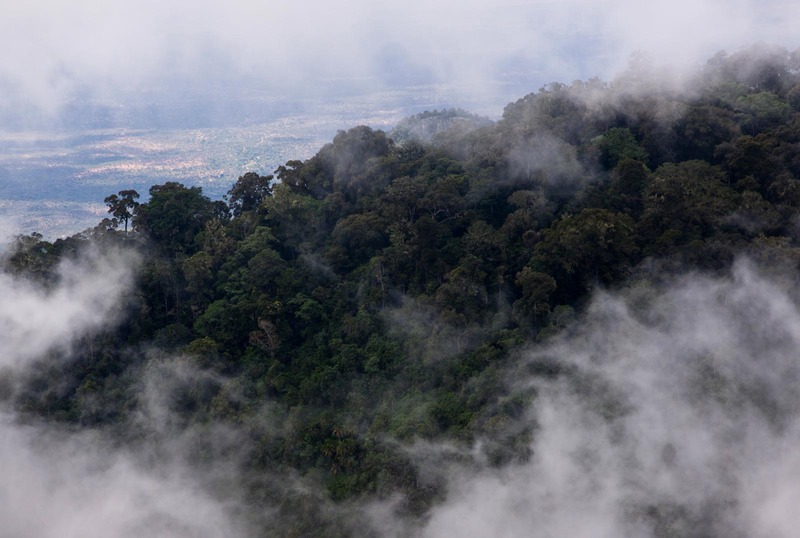
For years, private investors have been urging policymakers to help them invest in protecting forests. A new, first-of-its-kind investment mechanism could bridge the gap by unlocking private financing to stimulate investor demand for reducing deforestation.
The Forests Bond will provide investors the opportunity to invest in a traditional financial product that offers the unique option of receiving interest payments in the form of environmental impact-in this case, verified carbon credits generated through REDD, an initiative that rewards landholders for protecting forests, thereby reducing carbon emissions that worsen climate change. The development of the bond is a collaboration of the International Finance Corporation (IFC), a member of the World Bank Group, and BHP Billiton, a leading global resources company with technical support from Baker & McKenzie and Conservation International (CI).
REDD (short for Reducing Emissions from Deforestation and forest Degradation), which offers financial incentives to landholders in tropical countries to keep their forests standing, has met with mixed success since its launch in 2005, in part because the lack of a carbon market left it dependent on voluntary action and bereft of the certainty needed to attract private funding.
Agustin Silvani, CI’s vice president of conservation finance, said: “If you look at the scale of the problem, roughly US$100 billion to $300 billion needed to cut deforestation by half over the next decade, it’s clear that we need to mobilize private institutional investors, who control vastly greater amounts than public or philanthropic aid can deliver. The REDD mechanism has mostly excluded them because it required specific carbon expertise or a specific interest in forests to engage with it. “The bond could help create a new channel for private funding of forest protection,” Silvani said. “There’s a difference between creating a new project or product that can be replicated, versus creating an entirely new asset class. With the Forests Bond, that’s what we’re trying to do here.”
The Forests Bond supports a REDD project in Kenya, and investors can choose between a cash or carbon credit coupon (the interest received from the bond), or a combination of both. This unique element of the bond is made possible by the price support that BHP Billiton is providing, which means that investors can either elect to take the carbon credits to offset corporate greenhouse gas emissions or sell them on the carbon market, or take a traditional financial return instead. This provides the certainty needed to attract institutional investors while still generating verified reductions in deforestation, in the form of REDD credits.
The bond, which will be listed on the London Stock Exchange, brings the global deforestation challenge to the forefront of the climate agenda, said Jingdong Hua, IFC vice president and treasurer.
Each year, the world loses around 5.5 million hectares (13.6 million acres) of tropical forest – an area approximately the size of Costa Rica – and deforestation accounts for nearly 11 percent of global greenhouse gas emissions caused by humans, comparable to the emissions from all of the cars and trucks on Earth combined. Protecting forests is critical to achieving the global climate commitment of keeping the global warming under 2 degrees Celsius.
“To do that, we need to mobilize US$ 75 billion to 300 billion in the next decade, and much of this needs to come from the private sector,” Hua said. “The IFC Forests Bond demonstrates that innovative capital market mechanisms can be a powerful way to channel private sector funds into forest protection in emerging markets.”
The REDD project that the Forests Bond will support takes place in the Kasigau Corridor in eastern Kenya; it aims to achieve emissions reductions through a combination of forest protection and community development activities that support alternative livelihoods. Forest protection activities include forest and biodiversity monitoring, funding for community wildlife scouts, forest patrols, social monitoring and carbon inventory monitoring. Community development activities include reforestation of Mount Kasigau; establishment of an eco-charcoal production facility; support to community-based organizations; and expanding an organic clothing facility.
To ensure that the bond is not a one-off, BHP Billiton has helped develop a Knowledge Sharing Platform, in partnership with Conservation International and law firm Baker & McKenzie, to encourage investment in REDD initiatives, using the Forests Bond as an example.
“The platform aims to build a global community of practice among project developers, governments, donors and the private sector to explore how to overcome key market, governance and financial bottlenecks to replicate investment products like the Forests Bond,” said BHP Billiton Vice President of Sustainability and Climate Change Dr. Fiona Wild.
Original article on Conservation International https://blog.conservation.org/2016/10/new-bond-aims-to-unlock-private-investment-to-protect-forests/